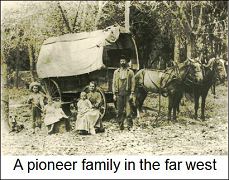A Word of Encouragement from Elizabeth Rice Handford
My big sister Grace was three when Mary Lloys was born. Mary Lloys was crying as only a newborn can cry. Grace listened to the squalling, walked over to her bassinet, held up a reproving finger to the weeping baby and said, “Nice people don’t dooz that!”
Only three, Gracie already knew how nice people were supposed to act, because she’d learned it from our father. Daddy was passionate that we six Rice girls behave well, no matter what situation we were in. You’ll understand this better when I tell you about his difficult childhood.
Daddy grew up on the harsh West Texas frontier. When he was only four, his father took the family to camp in a covered wagon in the far west for two years in a desperate attempt to cure Daddy’s mother of  tuberculosis. (Then the only known cure was to live in the open air.) When she died, they moved back home, but it was a typical prairie house: one big room for cooking and eating and socializing, a bedroom for the father, the children sleeping in the big room or in the loft. Grandpa Rice did the best he could for his four motherless children.
tuberculosis. (Then the only known cure was to live in the open air.) When she died, they moved back home, but it was a typical prairie house: one big room for cooking and eating and socializing, a bedroom for the father, the children sleeping in the big room or in the loft. Grandpa Rice did the best he could for his four motherless children.
When Daddy was perhaps ten years old, the country doctor hired him to ride in his buggy so he could open and close the gates of that rural community. That experience gave my father a glimpse of how a cultured family might live. Why, the doctor even had a separate dining room and a parlor. His guests ate on china plates. The silverware matched, and every guest even had his own cloth napkin.
So Daddy grew up yearning for a home like “nice people” had, and with the manners of “nice people.” (You understand, my parents also taught us the really important things good Christians should do. They taught us, and demonstrated it well, to offer real grace to every one. My parents lived their lives for others, and gave of themselves liberally wherever they saw a need.)
When Walt and I married, of course I wanted a home like “nice people” had. But Walt was a pastor, and finances were tight, and we always had heaps of people in our home. Sometimes I was embarrassed by our meager furnishings. (We called our furniture style “early Salvation Army” because we bought it at their thrift shop.)
One day one of our older church members invited me to her apartment for lunch. She served me a bowl of soup and crackers. We ate in her small kitchen, with paper plates and napkins. But our conversation was delightful and Christ-honoring. That day the Lord helped me to see a better way to take care of the people God gave us to minister to. I didn’t need an elegant house or fancy china. Our people simply needed a kind and attentive ear to listen to their troubles and to help them find godly solutions. They didn’t need a gourmet dinner; they needed to be loved and warmed. They needed the courtesy of respect, the honesty of faithful counsel. I should already known this; my mother constantly demonstrated that kind of hospitality.
Proverbs 15:15-17 says, “He who is of a merry heart has a continual feast. Better is a little with the fear of the LORD, Than great treasure with trouble. Better is a dinner of herbs where love is, Than a fatted calf with hatred.”
Isaiah 58:10,11 makes a promise: “If you extend your soul to the hungry nd satisfy the afflicted soul, Then your light shall dawn in the darkness, And your darkness shall be as the noonday. The LORD will guide you continually, And satisfy your soul in drought, And strengthen your bones; You shall be like a watered garden, And like a spring of water, whose waters do not fail.” Walt and I tried to make that true of our home, and I believe God honored it.
So, yes, come on over and have a bowl of hot Campbell soup with me and let’s talk about Jesus!
